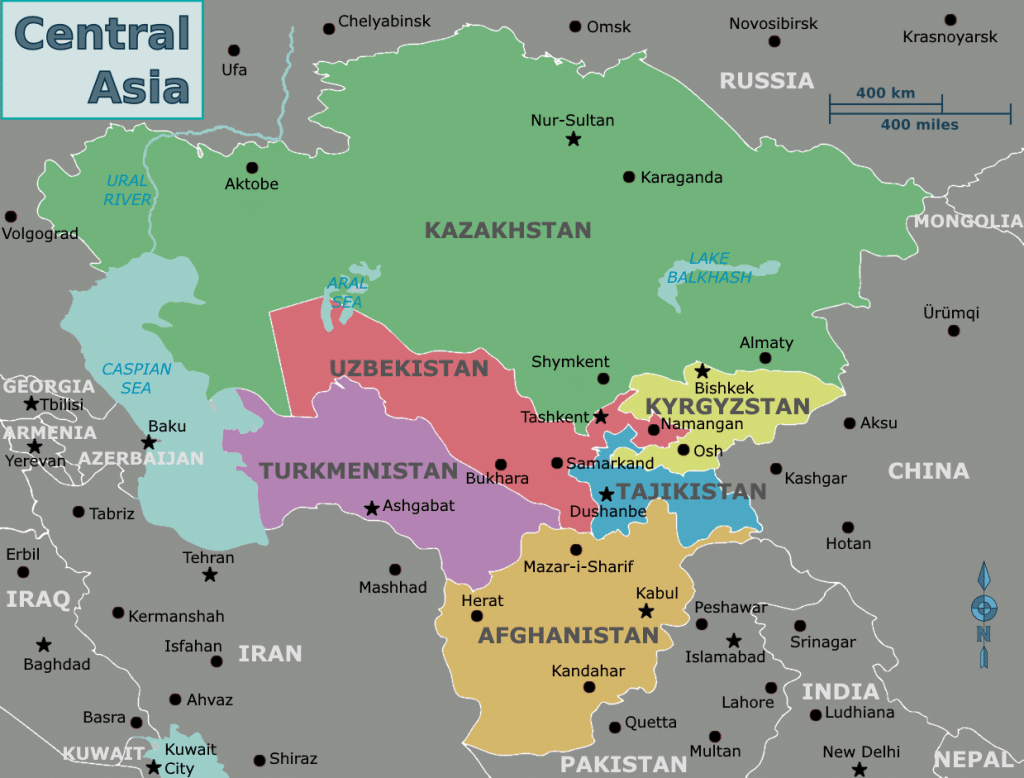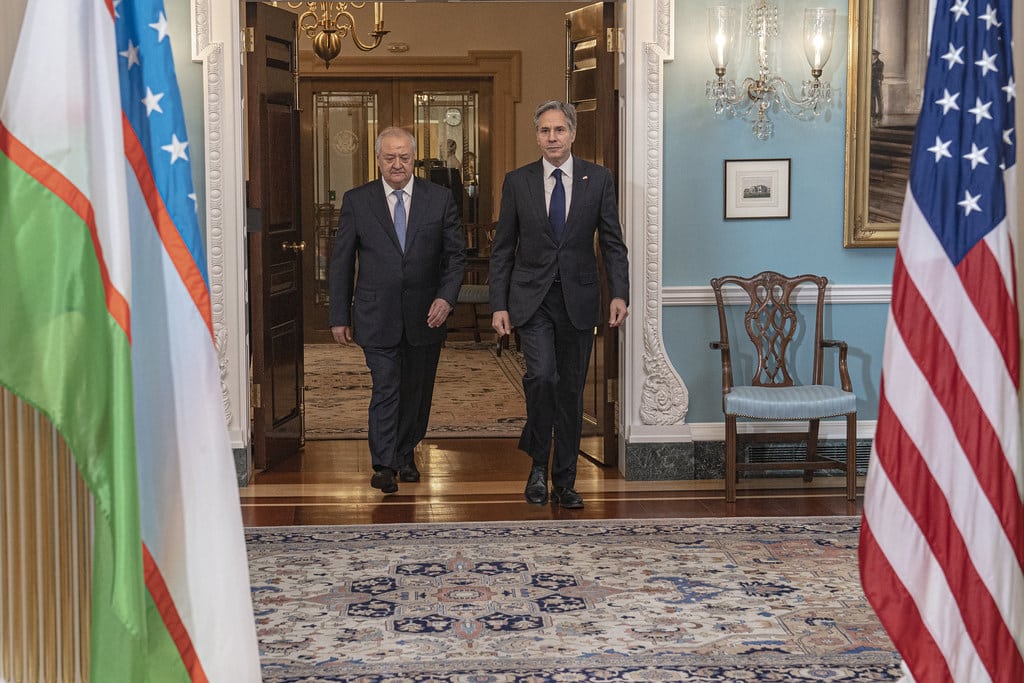
The Minister of Investments, Industry, and Trade of the Republic of Uzbekistan, Laziz Kudratov, recently met with the U.S. Deputy Assistant Secretary for Commerce, David De Falco, in the capital of this Central Asian country to discuss further strengthening trade and economic cooperation between the two countries. The most recent meeting, held on October 7, followed the signing of a Memorandum of Understanding on Critical Minerals and a Customs Mutual Assistance Agreement (CMAA) between the U.S. and Uzbekistan last month. Earlier, in early September, the U.S. and Uzbekistan formalized the transfer of several aircraft that had been moved to Uzbekistan following the Taliban’s takeover of Afghanistan in 2021. At that time, 22 planes Embraer 314 Super Tucano, and 24 helicopters of the UH-60 Black Hawk, MD 530, and Mi-17 types, which had been used by the Afghan Air Force, were transferred to Uzbekistan.
In addition to mutual interests, the Russian aggression against Ukraine that began in 2022 seems to have played a decisive role in the rapid strengthening of bilateral ties between Washington and Tashkent. As a result, the Central Asian region, although not geographically close to Eastern Europe, has become a key battleground for great power competition, with Uzbekistan, the largest country in the region, occupying a special place. As Russia's influence in this former Soviet republic diminishes due to the conflict in Ukraine, and China's economic influence in the region grows, the U.S. sees an opportunity to secure stability and security across Central Asia through stronger diplomatic and economic ties with Uzbekistan. However, the question remains whether Washington can regain the status of "Uzbekistan's sixth neighbor," a position it enjoyed in this country at the beginning of the 21st century.
Following the dissolution of the Soviet Union, especially after September 11, 2001, and during the war in Afghanistan, Uzbekistan established very close relations with the U.S., which became an important partner in the country's security, economy, and development. During this period, the U.S. provided aid to Uzbekistan for economic development and infrastructure projects, as well as to strengthen its own security. The U.S. military also used the "K2" airbase (Karshi-Khanabad Air Base) in Uzbekistan, making the country a strategic ally in supporting the fight against terrorism. It was under these circumstances that the concept of the "sixth neighbor" emerged, symbolizing the deepening cooperation and strategic relations, emphasizing the importance of the U.S. as a partner in the region. However, relations between the two countries have changed over the years, especially due to disagreements over human rights issues in Uzbekistan, and today, the focus is primarily on economic cooperation and regional stability.
On the other hand, although Uzbekistan was part of the Soviet Union, Russia's influence remained even after the country gained independence on September 1, 1991. This influence partly stemmed from historical ties with Moscow and partly from Uzbekistan's dependence on Russian transport corridors to export its products and trade in energy resources, given its landlocked status. However, following Russia’s invasion of Ukraine, Tashkent was forced to redefine its relations with Moscow, as international sanctions against the Kremlin rendered this trade route unsustainable. Most of Uzbekistan’s trade routes, known as the "Northern Corridor," passed through Kazakhstan and Russia. With no direct access to the sea, and neither of its neighbors having such access (the Caspian Sea lacks direct access to the oceans), Uzbekistan found a solution in the previously peripheral route known as the "Middle Corridor," connecting Asia and Europe via two Kazakh ports. Expanding this corridor to Turkmenistan and further through the "Trans-Caucasian Transit Corridor" with Azerbaijan, Georgia, Turkey, and ports on the Black and Mediterranean Seas would create a new trade route with Europe. In this context, there is an opportunity for the U.S. to support Uzbekistan, especially as the U.S. has long been interested in supporting Turkmenistan’s plans to modernize and enhance its railway infrastructure.

While Russia remains present in the region, Uzbekistan has sought alternative economic and political partners to reduce its dependence on Moscow. The Uzbek leadership has gradually increased its economic engagement with China, which has overtaken Russia as Uzbekistan's largest trading partner in recent years. Trade between China and Uzbekistan grew from $4.2 billion in 2017 to approximately $14 billion in 2023, while trade with Russia, despite growing over the same period, increased from $4.5 billion in 2017 to $10 billion in 2023. Given the tense global relations between China and the U.S., Tashkent finds itself balancing between these two powers, seeking new partners and greater U.S. involvement to diversify its economy. However, trade between the U.S. and Uzbekistan remains significantly smaller than with China or Russia. In recent years, trade has seen steady growth, rising from $355 million in 2018 to $650 million in 2023.
Alongside efforts to find new economic partners, Uzbekistan has shown a certain shift in its international stance towards Moscow regarding the Russian aggression against Ukraine. Tashkent has supported Ukraine's territorial integrity and complies with international sanctions imposed on Russia. Politically, Uzbekistan has already expanded its cooperation with Western European countries through numerous meetings with high-level EU representatives. Moreover, bilateral meetings between top Uzbek officials and U.S. representatives have opened the door to further investment, support for infrastructure development, assistance with ongoing reforms, and help with Uzbekistan's accession to the World Trade Organization (WTO), to which it applied back in December 1994. Since August 2024, there has been significant progress in U.S.-Uzbekistan trade relations. Two months earlier, during a visit to Uzbekistan, United States Trade Representative Ambassador Katherine Tai expressed full support for the U.S. Congress's efforts to renew the Generalized System of Preferences (GSP) program, which would improve access to U.S. markets for Uzbek products. The GSP program has benefited many developing countries by providing duty-free treatment for their products, and its absence in Uzbekistan has directly affected the underdeveloped trade volume between the two countries. This issue was also discussed during the recent October meeting in Tashkent. A similar GSP program with the European Union, established in 2021, saw trade between Uzbekistan and the EU grow from $3.9 billion (2021) to $5.8 billion (2023) in just two years.
All indications are that the GSP with Uzbekistan will be established, especially considering that on September 13, 2024, Akmalhoja Mavlonov, Chairman of Uzbekistan's Customs Committee, and Troy Miller, U.S. Acting Commissioner of Customs and Border Protection, signed the Customs Mutual Assistance Agreement (CMAA). This agreement marks a milestone in strengthening bilateral relations, allowing the two countries to exchange customs information and enhance cooperation in combating drug trafficking, human trafficking, transnational criminal groups, money laundering, and customs evasion. This issue is of particular importance to Uzbekistan, which faces significant challenges in border control due to its proximity to Afghanistan and the presence of criminal groups in the region. The agreement with the U.S. will provide substantial support to Uzbekistan in addressing these problems, contributing to regional stability, reducing the risk of terrorism, and improving economic conditions through safer trade.
Another important document signed three days later pertains to further deepening economic cooperation between Washington and Tashkent. The Memorandum of Understanding on Critical Minerals, signed by U.S. Ambassador to Uzbekistan, Jonathan Henick, and Uzbekistan's First Deputy Minister of Geology, Omonullo Nasritdinkhodjaev, represents a significant step in advancing cooperation in mineral extraction and processing, thus strengthening energy and economic ties. The partnership is also aligned with broader regional initiatives, as critical minerals were a key topic at last year’s C5+1 summit (Kazakhstan, Kyrgyzstan, Tajikistan, Turkmenistan, Uzbekistan + U.S.), held in September 2023 in New York, where U.S. President Biden and the leaders of five Central Asian countries highlighted the importance of advancing the clean energy transition while preserving regional ecosystems.

With global efforts to transition to green technologies and reduce dependence on traditional energy sources, critical minerals have become a focal point of interest for many countries, including the U.S. Uzbekistan, with its rich mineral resources, including gold, copper, tungsten, and uranium (the world’s fifth-largest supplier), is positioning itself as a key partner for the U.S. The Memorandum on Critical Minerals comes at a time when Uzbekistan is working to diversify its economy and become a key player in the global supply chain of strategic minerals, which could lead to increased foreign investment in its mining sector.
Thus, the deepening of Uzbekistan-U.S. relations has broader geopolitical implications, especially in the context of regional stability and the economic connectivity of Central Asian countries. Washington has demonstrated its interest in further strengthening ties with countries in the region through various programs and formats. For instance, within the framework of the 79th session of the UN General Assembly in New York, on September 27, 2024, a C5+1 Ministerial Meeting was held, during which U.S. Secretary of State Antony Blinken and the Foreign Ministers of Uzbekistan Bakhtiyor Saidov, Tajikistan Sirojiddin Mukhriddin, Turkmenistan Rashid Meredov, Kyrgyzstan Zheenbek Kulubaev, and Kazakhstan Murat Nurtleu reaffirmed the importance of this regional platform for cooperation in achieving joint security goals, addressing transnational challenges, promoting economic prosperity, and advancing human rights, including the empowerment of women, child protection, and the rights of persons with disabilities.
From everything mentioned, it is clear that Uzbekistan, as the largest country in Central Asia, plays a crucial role in regional dynamics in this part of the world. Its strategic position makes it an important bridge between Asia and Europe, and the growing cooperation with the U.S. can further strengthen its geopolitical position, increasing its influence on future regional developments. Moreover, agreements such as the CMAA and the Memorandum on Critical Minerals strengthen its role in global supply chains, as well as in the fight against transnational crime, especially considering that the U.S. views Uzbekistan as a key partner in this region with whom they can work together to combat threats like terrorism, extremism, and human trafficking. However, despite the desire to enhance cooperation with the U.S., challenges remain, such as Uzbekistan's economic and political dependence on Russia and China, and we should not overlook the fact that Uzbekistan is a member of the Shanghai Cooperation Organization, which also includes China, Russia, India, Belarus, Iran, Kazakhstan, Kyrgyzstan, Pakistan, and Tajikistan. Beijing and Moscow continue to play very important roles in the country's economy, and although the war in Ukraine has to some extent marked a turning point in Uzbekistan's foreign policy, creating an opportunity for the U.S. to strengthen its influence in the region, any sudden change in its geopolitical course could have negative consequences for this Central Asian country.


